Q&A with Professor David Barstow, chair of the Investigative Reporting Program at UC Berkeley Journalism
UC Berkeley Journalism’s Investigative Reporting Program (IRP) has 50 graduate students working on some 15 to 20 investigative projects at any one time — projects that are winning the world’s most prestigious journalism awards. Alums Katey Rusch, MJ ’20, and Casey Smith, MJ ’20, have just won the Polk Award, Selden Ring, Goldsmith Prize, and an Investigative Reporters and Editors award for a story developed at the IRP that exposes California’s “clean-records” agreements that obscure police misconduct. IRP stories have won three Polk awards in the last four years. And the stories are leading to policy changes. So what magic is happening at Berkeley’s IRP? David Barstow, the Reva and David Logan Distinguished Chair in Investigative Journalism — who is the first journalist to win four Pulitzer Prizes — talks about how his team at the IRP is developing the world’s next generation of investigative reporters, as quickly as possible and just when the world needs them most.
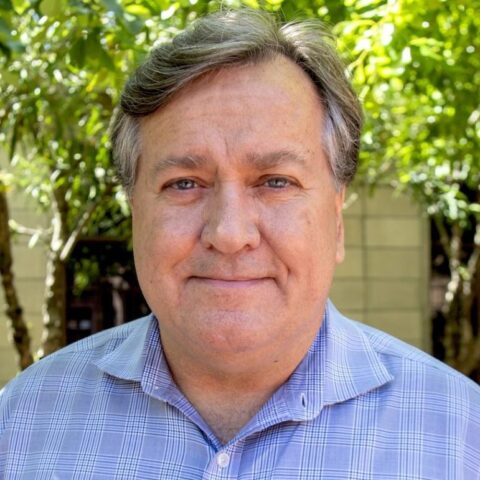
Professor David Barstow. Photo: Wesaam Al-Badry (’20).
Why did you decide to leave The New York Times at the top of your game to join the Investigative Reporting Program more than six years ago?
Well, the simple reason is because the truth needs reinforcements. And I came here to recruit.
You’ve called the work at the IRP a “radical experiment.” How so?
The ecosystem that [has] traditionally made investigative reporters in this country was horribly broken. And I wondered if, through the Investigative Reporting Program, we could address that problem in a more direct way. I wanted to try something radical. I wanted to test the proposition that if we gave our students the chance to actually conceive of and execute their own investigative reporting under their names – under their bylines – if we gave them that responsibility and then surrounded them with a ton of editing and mentoring and teaching support, could our students actually rapidly accelerate their development as investigative reporters? Could they actually produce investigative storytelling that could stand toe to toe with the very best investigative storytelling that you can find today at the very best news organizations?
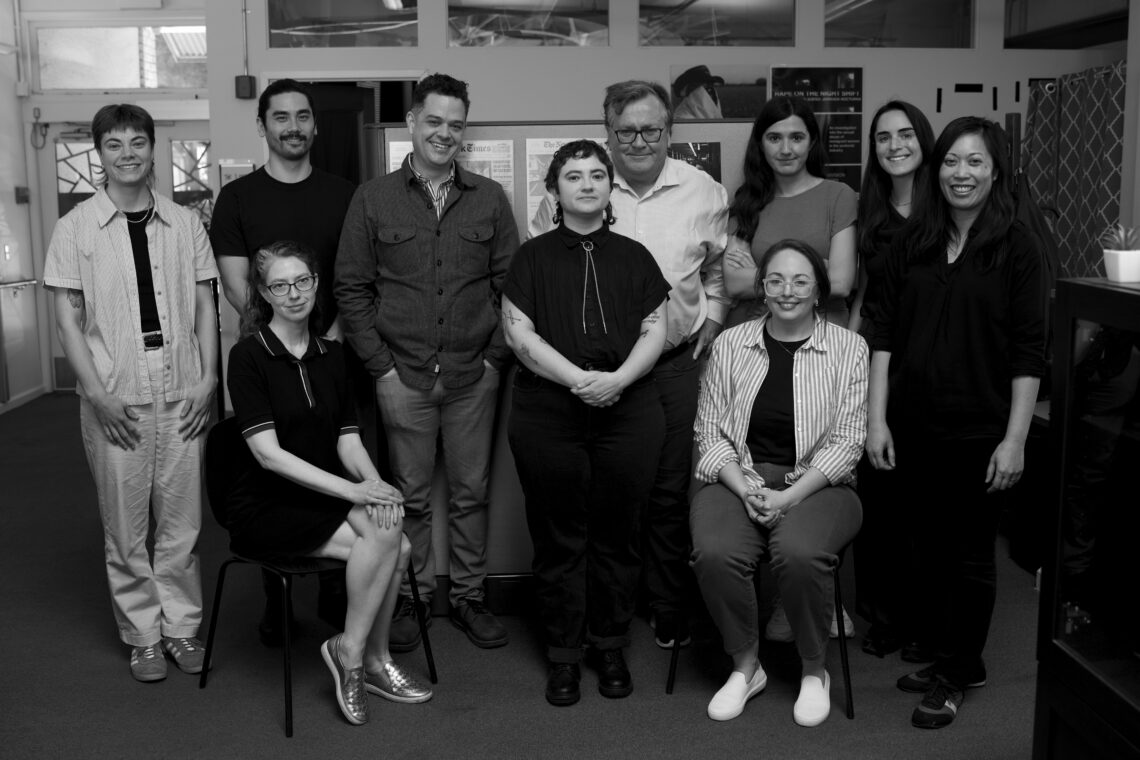
The IRP’s faculty and staff from left to right: Kate Raphael (’24) , Lisa Pickoff-White (‘09), Sasha Schell (’24), Garrett Therolf, Aysha Pettigrew, David Barstow, Yasmin Rafiei, Katey Rusch (’20), Kathryn Hurd (’21) and Bernice Yeung. Not pictured: Christine Schiavo. Photo: Marlena Telvick
How does this experiment at the IRP fly in the face of how investigative journalists are usually made?
There’s been this long-held belief in journalism that the only people who are allowed to do investigative reporting [are] reporters with vast amounts of experience covering all the various beats. And that maybe, maybe, maybe if you spent years and years and years doing that kind of work, you might at some point get an opportunity to do investigative reporting. What we are attempting to do is actually challenge a piece of dogma that has existed in investigative reporting circles for a long time.
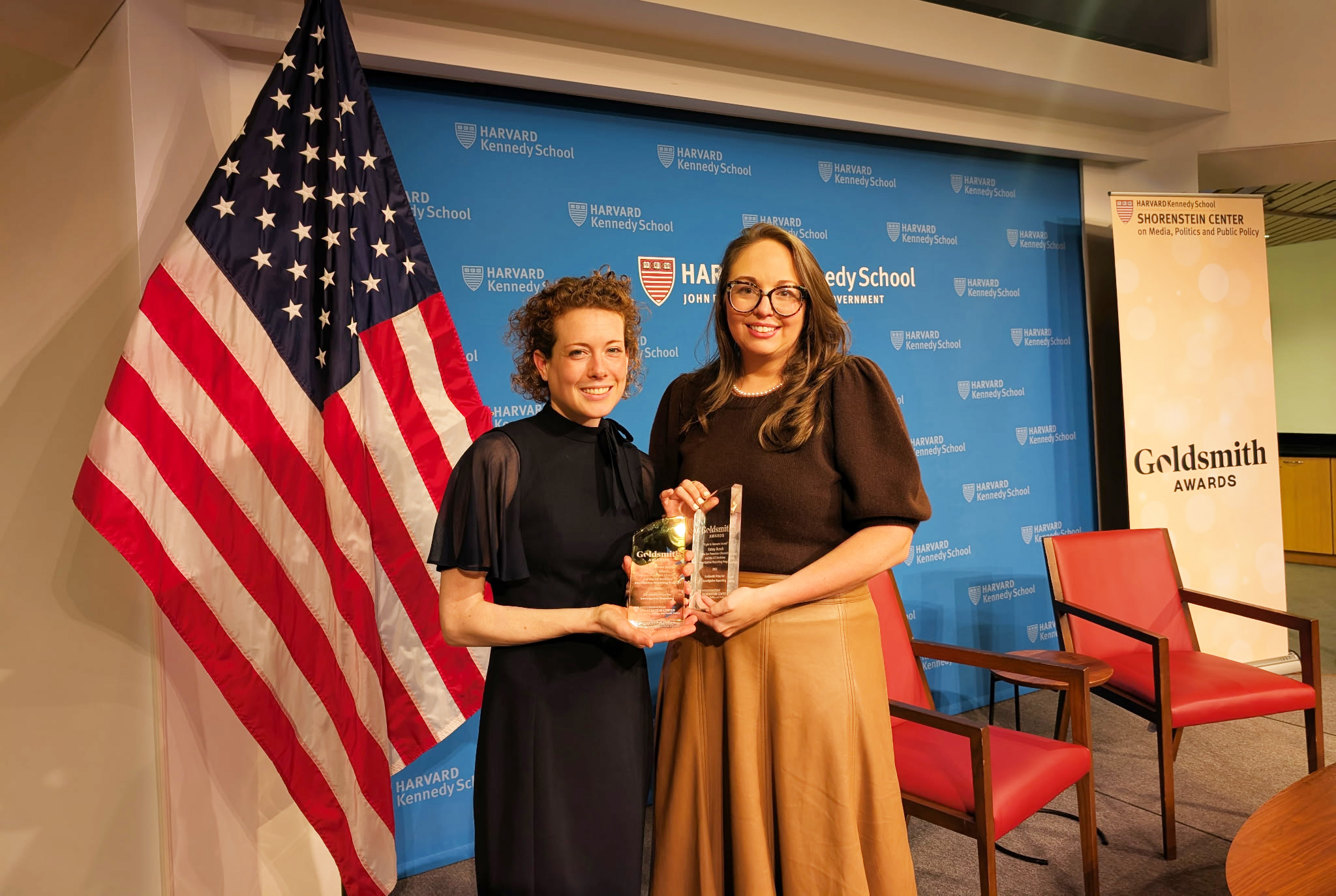
Casey Smith (’20) and Katey Rusch (’20) after winning the prestigious Goldsmith Prize for their investigative story, developed at the IRP, about “clean records agreements” that obscure police misconduct. The story, which has won a string of awards, was published in the San Francisco Chronicle.
How does the diversity of the IRP newsroom — in terms of gender, race, economic background, nationality, religion, political orientation and more — affect the reporting in tangible ways?
When the only people doing investigative reporting look exactly like me, we miss huge stories. That is, in fact, kind of the history of investigative reporting in this country. For far too long, we have missed so many important stories. It is not an accident that the #MeToo reporting was done by Megan Twohey and Jodi Kantor. It was not an accident the 1619 Project was the brainchild of Nikole Hannah-Jones, and we see this over and over again with our students. We are asking them to come to us with their full selves, with their entire lives…. It became really evident pretty quickly when students were coming to the table with an entirely new set of ideas about what we should be investigating, what was worth investigating, ideas that certainly I had never dreamed up before.
“As long as you are incredibly, insanely curious and incredibly and insanely persistent, we think we can turn you into a great investigative reporter. And our basic goal, our basic objective, is to make as many early career journalists fall hopelessly and madly in love with investigative reporting as we possibly can.”
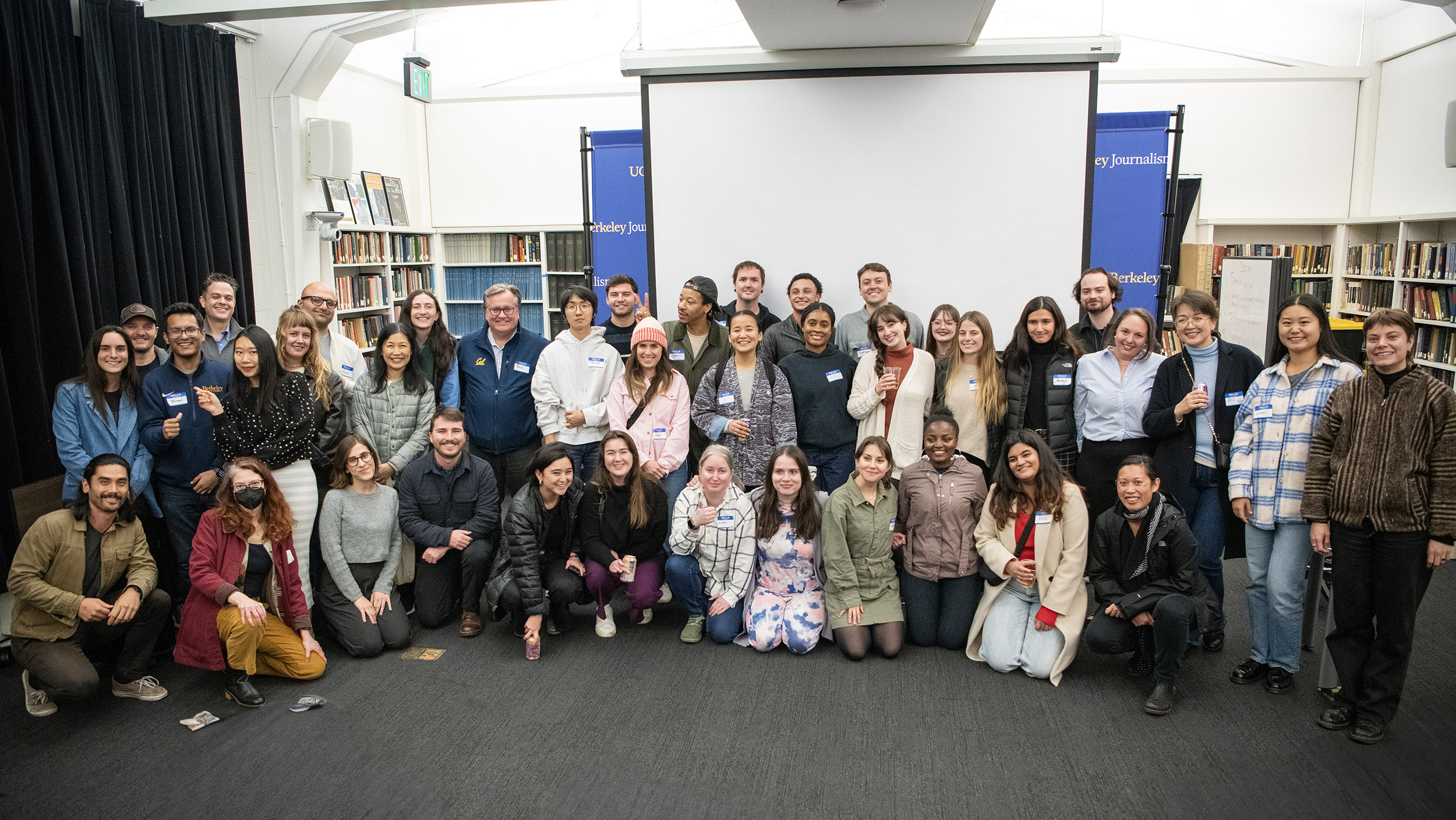
The Investigative Reporting Program’s inaugural alumni reunion November 2024. Photo: Luiz Monticelli (’25)
How do you accelerate the pace of producing investigative reporters?
One of the things that we’ve been trying to do is give our students ownership, give them agency, give them the opportunity. You want to be in the game? Fine. We will put you in the game. We will let you get out there on the field and do work. We will hold you to very high standards. We are not [doing] junior varsity-level investigative reporting.
What we’re all trying to do is make the Investigative Reporting Program the single best place in the world to learn how to do investigative reporting. You don’t have much experience? You don’t have a long journalism career? Fine. As long as you are incredibly, insanely curious and incredibly and insanely persistent, we think we can turn you into a great investigative reporter. And our basic goal, our basic objective, is to make as many early career journalists fall hopelessly and madly in love with investigative reporting as we possibly can.
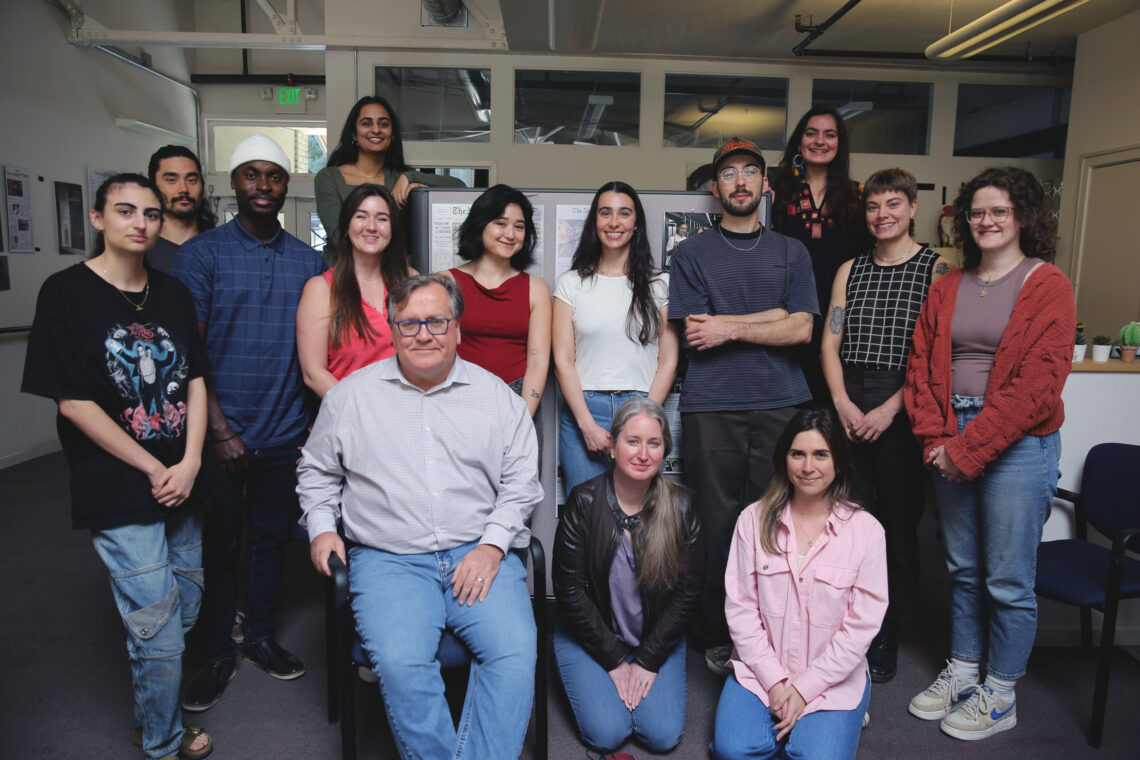
The Developing Your Blockbuster Investigative Story class pictured in 2024 in the newsroom of the IRP, from left to right: Marissa Muller, Sasha Schell, Charles Ayitey, Saumya Gupta, Laura Fitzgerald, Professor David Barstow, Hana Beach, Beki San Martin, Kathleen Quinn, Max Harrison-Caldwell, Cayla Mihalovich, Tarini Mehta, Kate Raphael and Cara Nixon. Photo: Marlena Telvick
How is investigative reporting different from other kinds of journalism?
It really is different from ordinary reporting. It is a kind of reporting that encourages every single person who does it to run directly at concentrated power – just go right at concentrated power and deliver very tough facts about how that power is being wielded, how that power is affecting ordinary people. We’re not relying on a press conference from a mayor or an indictment from a grand jury to say the things that we are saying about power. And so that kind of specialized knowledge of how to actually do this work and do it with incredible integrity, but also do it in a way that it can withstand the toughest scrutiny out there, that takes time.
When you do it really well you have an opportunity to actually change the way people think about the world. You have a chance to actually affect their understanding of how the world works. You see a legislator stand up and say, “There ought to be a law!” You see a regulator stand up and say, “We’re going to do something about that.” There are very few kinds of jobs where that feedback loop is so clear and obvious. We want our students to actually experience that feedback loop so that they understand the power of what this work represents.
“I’ve never felt greater urgency than right now in the work that we’re doing.”
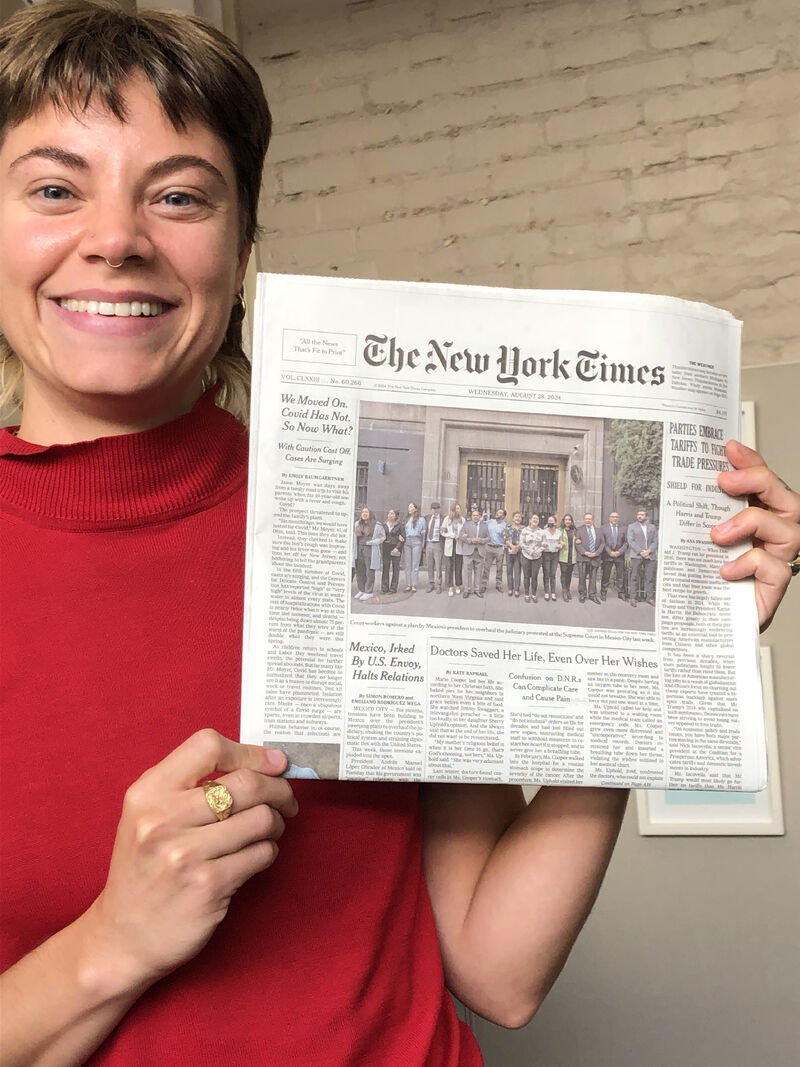
Kate Raphael (’24) holds up a copy of the New York Times front page where her investigative piece was published in August 2024.
Will investigative journalism survive this moment, this national and global move toward authoritarianism?
Autocrats the world over are trying to make people, like investigative reporters, disappear. They’re trying to drive us out of business. They’re jailing us, they’re exiling us. They’re doing everything they possibly can so that we don’t do the essential work of holding power to account. And that’s what the Investigative Reporting Program is all about: encouraging the next generation and the generation after that, and the generation after that, to pick up the torch and persist in asking the toughest questions about the most powerful people in the institutions in the country. That is a precious commodity. And if we lose that commodity, we are much, much less as a country, as a nation, as a democracy.
Why is investigative journalism so critical right now?
I’ve never felt greater urgency than right now in the work that we’re doing. I want a world – I fought for a world – my whole career where one plus one always equals two. And that’s actually what’s at stake right now in this moment. We have, in the White House, someone who insists daily that one plus one equals whatever he thinks it equals. And the ability of journalists to stand up to a campaign of demonization, a campaign that seeks to convert us into “enemies of the people,” a campaign of intimidation: we desperately need folks to stand up to that.
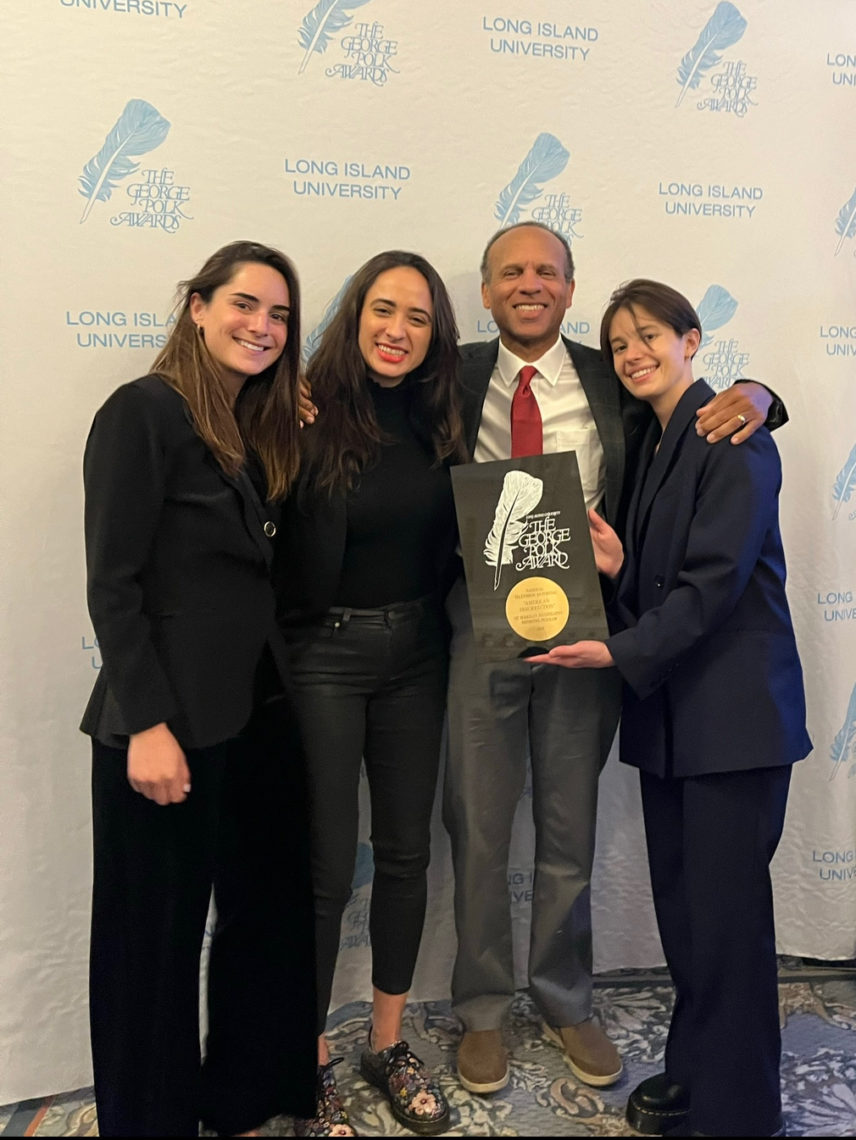
Kathryn Hurd (’21), Gisela Pérez de Acha (’20), lecturer David Thigpen and Ellie Lightfoot (’21) celebrate their win at the 2022 Polk Awards for “American Insurrection,” a collaboration between the IRP, PBS FRONTLINE and ProPublica.
When you came to the IRP, how did you know that you were going to be able to translate all that you knew about investigative reporting and holding power to account to students?
I came in here kind of feeling pretty terrified about whether I was going to be able to pull this off. But it turns out that being terrified has always been a great motivator for me throughout my career. What I discovered is that for all of my weaknesses and all of the things that I don’t know how to do, the one place where I feel really comfortable is talking to students about stories.
Only a fraction of your students will find jobs as investigative reporters — and even fewer at places like The New York Times. Why does this type of training still matter?
We think that every single thing that we teach translates easily and seamlessly to any other form of reporting that you end up doing. You want to be a sports reporter? You’re going to learn stuff that’s going to be very helpful. You want to be a food critic? I promise you, you’re going to learn things at the Investigative Reporting Program. The most important thing that we teach is the mindset that is required to do great reporting, the level of commitment that it takes to do great reporting and great storytelling.
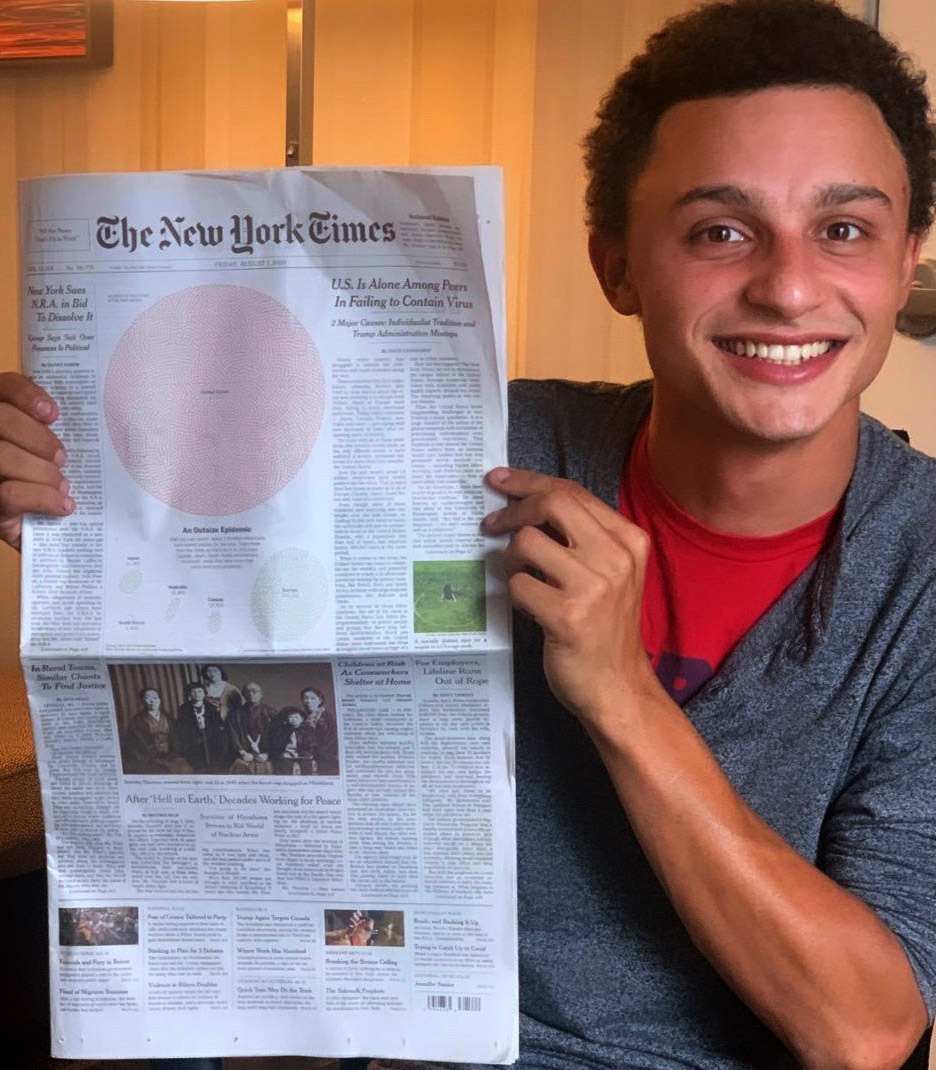
When your name appears on 1A of The New York Times for the very first time… Daniel Lempres (’21) on IRP team that published in-depth story about the pandemic’s impact on child abuse investigations in August 2020.
The stories students are producing at the IRP are winning awards — like significant awards.
A Polk Award is hard to win. I mean, that’s a career-making honor. It’s an award that, when you look at the legacy of stories that have been honored by the Polk Awards, it’s an incredible who’s who of journalism. That’s kind of stunning to me. There are newsrooms that go years and years and years without winning a Polk Award. And our students have done it three times in the last four years, and that’s pretty fucking great.
Besides the future of our democracy, what’s your biggest worry?
Almost 100 percent of the funding that we rely upon for this to work is money that we have to raise ourselves through gifts and grants, and other forms of support. And it’s probably the thing that keeps me up the most, worrying about making sure that we sustain this, now that we’ve demonstrated that this model actually works and works really effectively. I would hope that anyone who cares about journalism, anyone who cares especially about investigative reporting, would recognize that the thing that we’re doing here represents something that is structurally incredibly important, in terms of the future of journalism and the future of investigative reporting.
Will journalism survive this moment? Will our democracy persevere?
All I do know is that the kind of work that our students do is the kind of work that people who, who seek total power and total control, they’re doing everything they can within their ability to stamp it out. And I don’t want to live in that world. I want to live in the world of truth. I want to live in a world where one plus one always equals two, and I’m going to fight for it as long as I can.
//
Help us build a world where investigative journalism is open to anyone with persistence, curiosity, and integrity.
Right now, your gift will have maximum impact. Once we reach our crowdfunding goal of $5,000, a generous donor will unlock a $25,000 Big Match.
Turn 5K into 30K for the Investigative Reporting Program today. Donate here.
The Investigative Reporting Program at UC Berkeley Journalism hosts the 17th Annual Reva & David Logan Symposium on Investigative Reporting next week at UC Berkeley.
